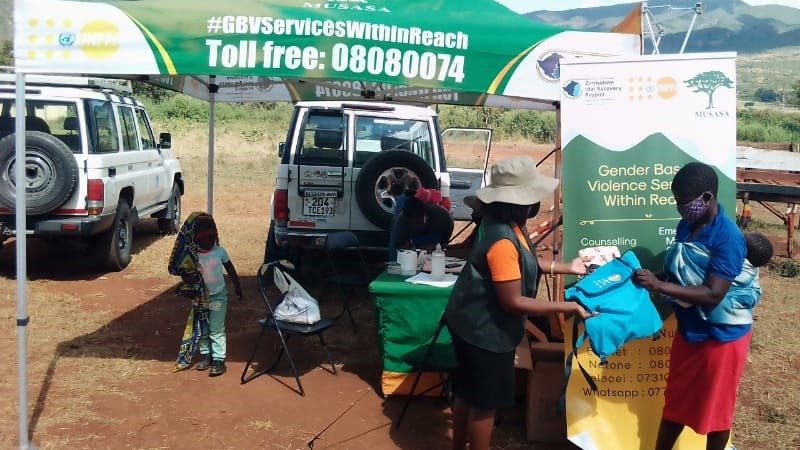Restoring hope for GBV survivors in ZIRP target areas
Praise is one of the many Gender-Based Violence (GBV) survivors who have been receiving life-saving services under the Zimbabwe Idai Recovery Project (ZIRP) in Chimanimani and Chipinge. ZIRP is being implemented in communities where beneficiaries have gone through distress and some precarious situations, such as loss of shelter, income, safety nets and family members. This has also increased the vulnerability of women and girls to GBV.
“My name is *Praise Mutigwe and I am a 45-year-old mother of three minors. I live with my husband, who is a teacher. My husband has physically assaulted me for the greater part of our marriage and he is an alcoholic. On the fateful day, my husband was sober, but he started threatening to kill me and the children. I hid myself in our outside kitchen and slept there with our kids while he attempted to break down the door, but he failed. In the morning, I left home and sought shelter at my uncle’s place, and I was referred to Musasa Project for specialised assistance. At Musasa, I was provided with counselling, legal advice and assisted with drafting a protection order against my husband. I was also assisted with money for transport to access legal services at court, where the judgment was granted in my favour. It was at this point that my husband decided to join me for couples’ counselling, where he was made to understand the implications of the abuse and what the protection order meant.”
The terrain in Chimanimani and Chipinge has made it difficult for women like Praise to access GBV services easily, especially after the damage caused by the floods. The situation has been further worsened by COVID-19 movement restrictions, which continue to present challenges in women and girls accessing services. Through the mobile One Stop Centres (OSC) model, ZIRP provides access to essential services for GBV support. This model entails the coordinated response of a multi-sectoral outreach team, comprising specialised GBV counsellors, paralegal officers, working in close coordination with nurses and police victim-friendly units. The mobile OSC model has proved as the most effective approach to enhance service uptake in remote and hard to reach areas, including during the COVID19 lockdown, by addressing mobility challenges of reaching static services by those living in more isolated wards. Mobile OSCs are integrated into the broader mobile clinic model led by the World Health Organisation (WHO).
A total of 1508 survivors – 59 males and 1449 females accessed services during the period from April to June 2021, while 74 survivors, including Praise, were provided with transport assistance to access higher levels of GBV care, including at static health facilities and GBV shelters.
Sharon Matingwina, Musasa Project Programmes Officer, explained how ZIRP leverages existing community structures to promote GBV awareness. Behaviour Change Facilitators work closely with other sector-specific cadres, such as the village health workers and agriculture extension workers, to integrate GBV information on referral pathways into their respective awareness programmes.
“Beneficiaries who got all services praised this model, and upon follow-ups, they showed accelerated physical and emotional recovery as they remained in touch with the existing safe spaces. The project has been targeting the most remote parts of the two districts, thereby taking an all-inclusive, leave-no-one-behind approach.” Sharon said.
To raise community awareness on the availability of GBV services, Musasa is using radio for communication. The radio jingles that have since been produced and played on local radio stations have increased information dissemination on available GBV services while encouraging communities to desist from GBV. This has led to increased demand creation as the static walk-in centres and mobile OSCs recorded an increased number of survivors seeking services.
“My relationship with my husband has greatly improved and he is no longer beating, harassing or threatening to kill me. He is remorseful of his past conduct and showing me love and affection, and my children are living in a peaceful and conducive environment for their growth,” *Praise said during a follow-up visit.

